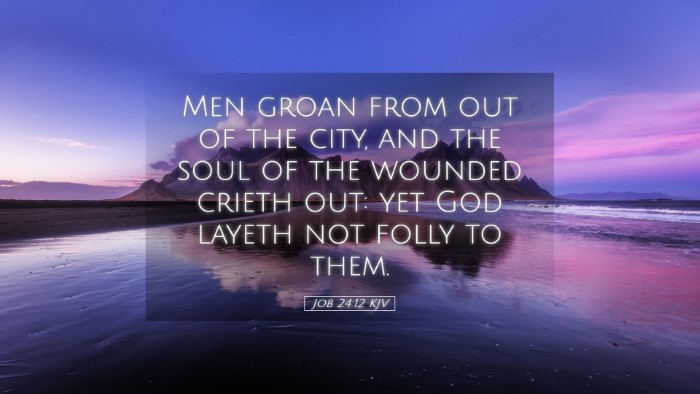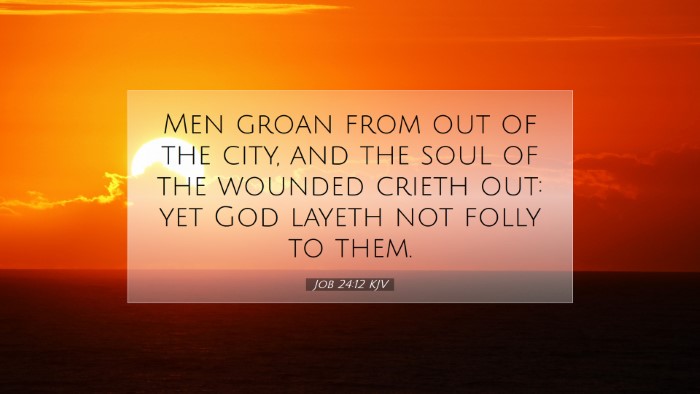Old Testament
Genesis Exodus Leviticus Numbers Deuteronomy Joshua Judges Ruth 1 Samuel 2 Samuel 1 Kings 2 Kings 1 Chronicles 2 Chronicles Ezra Nehemiah Esther Job Psalms Proverbs Ecclesiastes Song of Solomon Isaiah Jeremiah Lamentations Ezekiel Daniel Hosea Joel Amos Obadiah Jonah Micah Nahum Habakkuk Zephaniah Haggai Zechariah MalachiJob 24:12
Job 24:12 KJV
Men groan from out of the city, and the soul of the wounded crieth out: yet God layeth not folly to them.
Job 24:12 Bible Commentary
Commentary on Job 24:12
Bible Verse: Job 24:12 - "In the city the dying groan, and the souls of the wounded cry out for help. But God charges no one with wrongdoing."
Introduction
The verse under consideration reveals a poignant scene of suffering and injustice. The juxtaposition of the cries of the afflicted against the backdrop of divine silence raises profound questions about God's providence and the nature of human suffering. This commentary synthesizes insights from various public domain sources to elucidate the theological implications and practical applications of this verse.
Contextual Analysis
Job’s lamentation extends beyond personal suffering, reflecting a broader narrative of societal injustice. In the preceding speeches, Job has defended his integrity while questioning the nature of God’s justice. The verses that follow further explore the themes of divine oversight and human morality, making it crucial to analyze this verse within its broader context.
Job’s Situation
As theologians like Matthew Henry suggest, Job's account serves as a critical commentary on the problem of evil and suffering within the framework of a just God. Job is not merely lamenting his own fate; he observes the plight of others, particularly in urban settings where injustice is rampant. In Job 24:12, the city becomes a microcosm of humanity—illustrating the chaos and sorrow that permeates human experience.
The Cry of the Afflicted
According to Albert Barnes, the 'groans' of the dying and the 'cries' of the wounded symbolize the universal experience of distress. The urban landscape, with its density of souls, amplifies the despair. This acknowledgment of suffering highlights a critical existential reality—the recognition that many endure pain without immediate divine intervention. The emotional weight of this scene begs the question: why is there seemingly so much suffering in a world overseen by God?
The Divine Silence
Adam Clarke comments that the verse climaxes with a striking assertion: 'But God charges no one with wrongdoing.' Herein lies a tension; while humanity grapples with sin and suffering, God refrains from immediate retribution. This introduces a profound theological conundrum—the nature of divine justice. Clarke interprets this as God allowing the afflictions to unfold, suggesting that the silence of God does not equate to neglect but rather a deeper, inscrutable purpose.
Theological Implications
The implications of this verse are multi-faceted, engaging with themes of justice, mercy, and divine oversight. It invites serious reflection on the character of God amid human suffering.
The Nature of Human Suffering
From a theological standpoint, the collective suffering represented in Job 24:12 can be understood as part of the human condition—a reality that scripture does not shy away from addressing. Matthew Henry emphasizes that such suffering is often incongruous with human perceptions of justice. The cries of the wounded serve as a reminder of our shared humanity and the importance of empathy and justice among individuals.
Divine Justice and Providence
This verse encapsulates a profound truth about God's relationship with humanity. Albert Barnes illuminates that while God may seem passive to the cries of injustice, His providence assures that ultimate justice will prevail. This tension invites believers to trust in God's timing and character even when present circumstances seem contradictory. The seeming absence of immediate divine action should fuel a deeper faith rather than a sense of despair.
The Role of the Believer
Understanding the implications of Job 24:12 compels believers to play an active role in alleviating suffering. The cries for help are a call to action for the community of faith. Adam Clarke argues that Christians are called to be agents of compassion, to stand with the oppressed, and to advocate for justice. This necessitates both personal and communal involvement in addressing the needs of the wounded, ensuring that their cries are not ignored.
Practical Applications
The insights gained from Job 24:12 urge both theological reflection and practical engagement. How can modern believers embody the principles reflected in Job's lamentation?
Empathy and Understanding
- Listen Actively: Foster an environment where the stories of the suffering are shared and heard.
- Acknowledge Pain: Recognize and validate the struggles of those around us, understanding that their experiences are real and impactful.
Advocacy for Justice
- Engagement in Social Issues: Take an active role in societal justice movements that align with biblical teachings of love and mercy.
- Support Local Ministries: Contribute to organizations that provide aid to the wounded and afflicted, embodying Christ's call to serve the least of these.
Faith Amid Suffering
- Foster a Trusting Heart: Encourage faith that persists in understanding God's nature even when circumstances seem somber.
- Community Support: Build a supportive community where individuals can find solace and strength in shared faith amid adversity.
Conclusion
Job 24:12 encapsulates the struggle between human suffering and divine oversight. It challenges believers to confront the realities of injustice and pain while holding fast to faith in God's ultimate plan. This commentary aims to enrich the understanding of pastors, students, and theologians regarding the essence of divine justice amidst a broken world. Drawing insights from historic figures such as Matthew Henry, Albert Barnes, and Adam Clarke, it reinforces the Christian call to respond to suffering with empathy, action, and unwavering faith.


